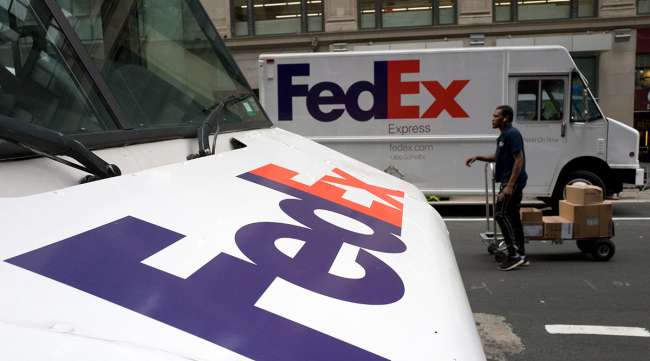Senior Reporter
FedEx Profits Soar, Revenue Rises in Fiscal First Quarter

FedEx Corp. reported a 40% spike in net income as well as higher revenue in its first quarter of fiscal 2019, owing to bustling economic conditions.
Chairman and CEO Frederick Smith also touted the company’s expectations for stronger gains in its FedEx Express segment.
“FedEx delivered higher first-quarter earnings driven by solid execution of our business plan and a strong U.S. economy,” Smith said.
Memphis, Tenn.-based FedEx said net income soared to $835 million, or $3.10 per diluted share, on revenue of $17.1 billion for the period ended Aug. 31.
A year earlier, net income was $596 million, or $2.19, on revenue of $15.3 billion.
“Our financial results benefited from higher volumes, increased yields and a favorable net impact of fuel at all of our transportation segments,” FedEx Chief Financial Officer Alan Graf said in an earnings call with financial analysts.
These factors were partially offset by higher transportation expenses as well as higher salaries and employee benefits expense in the quarter, the company said.
Earnings also benefited by 50 cents per share as a result of the enactment of the Tax Cut and Jobs Act, primarily from a lower statutory income tax rate, Graf said.
FedEx Corp. ranks No. 2 on the Transport Topics Top 100 list of for-hire carriers in North America.
Its primary operating companies are FedEx Express, including TNT Express, the world’s largest express transportation company; FedEx Ground Package System Inc., a North American provider of small-package ground delivery services; and FedEx Freight Corp., a U.S. provider of less-than-truckload freight transportation services. These companies represent its major service lines, along with FedEx Corporate Services Inc.
While strong international volume growth reflects the company’s recovery from the TNT Express cyberattack last year, the impact to operating income was partially offset by shifting service mix and the timing of variable compensation, aircraft maintenance and merit increases, Graf said.
Operating income at FedEx Express rose 15% to $367 million compared with $320 million a year earlier. Its operating margin improved to 4% from 3.8%.
“We’re very optimistic about our prospects for profitable growth and remain confident we’ll reach our goal to improve FedEx Express operating income by $1.2 billion to $1.5 billion in fiscal 2020 versus fiscal 2017,” Smith said.
FedEx Ground improved operating income in the period by 10% to $667 million from $606 million. Its operating margin dipped to 13.9% from 14.3%.
FedEx Freight’s operating income rose 7% to $176 million compared with $165 million a year ago. The operating margin slipped to 9% from 9.9%.
“We expect operating profits to be up year-over-year for the corporation and in all of our transportation segments,” Graf added.
Meanwhile, the company acquired 2.6 million shares of FedEx common stock during the quarter at an average price of $238.95.
The company projected adjusted earnings of $17.20 to $17.80 per share for fiscal year 2019, up from $17 to $17.60 — again citing a strong U.S. economy and its revenue management initiatives.
During the conference call, an executive emphasized two benefits it anticipates from using the blockchain — a secure, shared digital ledger.
“I think that there is an opportunity to usher in two pretty fundamental changes in logistics chains using blockchain technology,” FedEx Chief Information Officer Robert Carter said.
The first one is that custodial chains are very likely to extend beyond FedEx’s custody of the shipment from the pickup to the delivery, he said.
For instance, showing the origin of a pharma shipment, to know that its source was exactly what the end customer expected it to be, he said.
“The second big area of potential impact is blockchain’s smart contracts capability. Blockchains have the ability to embed contractual notions into that custody chain. Things like specific delivery commitments, dispute resolution. All of those kinds of things can be embedded into a blockchain to help satisfy the additional transactions that go on around the space of a shipment,” Carter said.




